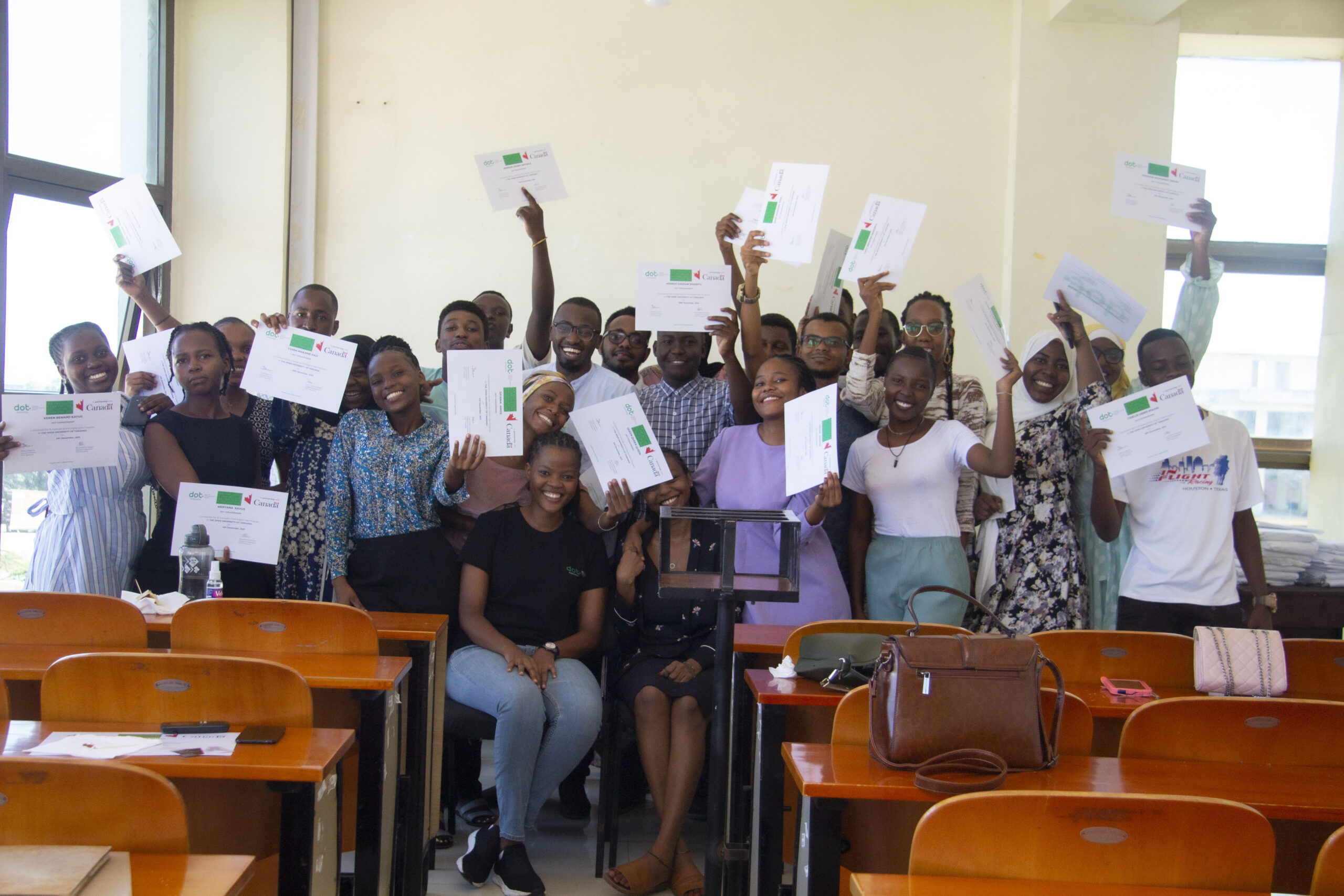DOT Transforms 1,000 Tanzanian Youth Through Digital Skills For Employment
Impact of Digital Jobs Program in Tanzania
In Tanzania, a group of 1,044 ambitious young men and women embarked on a path of transformation by enrolling in the Digital Jobs Program. They were determined to distinguish themselves in the ever-evolving job landscape. These unemployed and underemployed young professionals hailed from diverse educational and social backgrounds, all sharing a common aspiration: to grasp the abundant employment opportunities of the digital age.
Challenges and Aspirations Within the Tanzania Job Market
Their journey unfolded within the context of a challenging reality: Tanzania’s job market grapples with the annual influx of nearly one million young Tanzanians, yet it provides only approximately 340,000 fresh job openings each year. This enduring discrepancy has fueled the persisting issues of unemployment, underemployment, and the widening socioeconomic disparities that have deepened over time. It is also worth noting that a significant portion of these young men and women faced an additional hurdle – a lack of even the most basic digital skills required in the 21st-century job market.
The majority of the Youth who have gone through the program have stated that they joined the training because they wanted to familiarize themselves with basic digital skills, but most importantly they wanted to gain more knowledge to get employment and/or freelancing opportunities. The youth were mobilized by DOT’s Digital Ambassadors (peer facilitators of the program), in Dar Es Salaam and Arusha Region and the program’s success was evident as it exceeded its target of 500 participants.
The youth were mobilized by DOT’s Digital Ambassadors (peer facilitators of the program). The initial expectations were that the training would be more of a lecture and that they would be getting just basic knowledge.
Employment Readiness Through Digital Skills Empowerment
Participants in the Digital Jobs Program acquired a diverse set of digital skills and competencies essential for thriving in today’s job market. These included fundamental digital literacy, providing them with a solid foundation for confidently navigating the digital landscape. They gained proficiency in web development, equipping them with the ability to create websites and web applications, a highly sought-after skill in the modern job market.
“I was already doing some digital marketing work as a freelancer and volunteer, but I was not confident with my skills and did not know how to carry myself when approaching clients, the digital jobs program gave me all the confidence I needed” ~ Vanessa, student, and Digital Marketing Freelancer
The program also covered digital marketing, empowering participants to effectively promote products and services online, connect with their target audiences, and enhance both their professional profiles and those of their clients. A significant number of participants received training in data analysis, enabling them to make data-driven decisions and pursue research-oriented micro-tasks, such as data entry, management, and analysis.
These young men and women were equipped with popular productivity suites like G-Suite and Microsoft 365, providing them with the necessary tools for seamless collaboration and efficient document management in the digital workplace. These combined competencies uniquely positioned participants for success in the job market and offered a wide array of career opportunities.
The newfound skills have significantly bolstered the participants’ confidence in their pursuit of jobs, freelancing clients, and online opportunities. Many of the participants, notably young women, have expressed that these skills have empowered them to apply for positions they initially considered too ambitious and explore a wider range of freelancing opportunities, often with remarkable success.

A group of program participants and Digital Ambassadors at Graduation
Boost in Confidence and Real-world Challenges
Among the real-world challenges faced by these young women and men after acquiring digital skills, one notable hurdle was the need to adapt to a rapidly evolving digital landscape. The ever-changing nature of technology and digital platforms required them to stay updated and continuously learn to remain competitive in the job market. Additionally, some encountered challenges related to the availability of resources and access to stable internet connections, which were essential for their digital work. Despite these challenges, the skills gained through the program empowered them to navigate these obstacles and seize emerging opportunities.
Participants in the Digital Jobs Program have witnessed impressive outcomes, with many easily transitioning into the job market post-graduation or even while still in college. For instance, Victoria, a program participant, secured a role as a research assistant immediately after completing her undergraduate studies. Her responsibilities included confidently training research clerks, and highlighting the practical skills gained through the program.
“I secured employment right after my undergraduate studies as a research assistant, putting my skills to work. I was in charge of training the research clerks. Today, I can confidently say I excel in data visualization” ~ Victoria, Research Assistant
Support Networks and Success Stories
Mentors and support networks were established for these young participants in the program. The Digital Ambassadors, who were youth peers facilitating the Digital Jobs Program, served as mentors and coaches, providing valuable guidance and support. DOT Partners played a crucial role by engaging the participants, offering them additional skills, and facilitating connections to freelancing opportunities. This support network not only enhanced their learning experience but also significantly contributed to their success in the program.
An inspiring success story from the program involves Victoria, a young graduate who initially lacked confidence in her skills but went on to achieve a significant transformation in her life and career through her newly acquired digital skills. With newfound self-assurance, she actively pursued job opportunities and transitioned into a successful freelancer. Leveraging platforms like Upwork, she competes with professionals from around the world for job opportunities, illustrating the program’s profound impact on participants’ lives and career prospects.
Impact and Government Strategy
A significant outcome of the Digital Jobs Program is the substantial increase in the number of youth securing digital jobs and experiencing income growth. Remarkably, several program participants saw their monthly income surge by 20% due to new digitally-enabled work opportunities. This achievement directly aligns DOT Tanzania with the government’s strategy, aimed at equipping the national workforce with the necessary skills to enhance employability and promote self-employment. The government’s ambitious goal is to reduce the percentage of unskilled workers in the labor market from 77% in 2021 to 54% by 2025, a mission facilitated through the National Skills Development Strategy.
About Daring to Shift Project:
Daring to Shift is a transformative multinational project implemented by Digital Opportunity Trust from 2019 to 2023 in various communities across Africa and the Middle East. This innovative initiative made possible through a partnership with the Government of Canada, has empowered over 1,000 local youth, with a particular focus on young women as agents of positive change. Over the project’s duration, it reached more than 40,000 community beneficiaries, with 70% of them being women.
The project focused on equipping youth with essential skills such as digital literacy, workforce readiness, entrepreneurship, and social innovation. This holistic approach aimed to catalyze the creation of digital jobs, businesses, and local enterprises that address community-specific needs and value chains. The project is rooted in the belief that young people, as co-designers of their own futures, play a pivotal role in driving inclusive growth, fostering resilience, and enabling community recovery. By bridging the gender divide, transforming ecosystems, and promoting social and economic development, Daring to Shift represented a beacon of positive change across the regions it serves especially during and after the COVID-19 Pandemic.
Tags
Are you our next Community Leader, Digital Champion, or Social Innovator? Learn more about how to join #DOTYouth
Join #DOTYouthShare this Post
More ARTICLES
Read more like this.
